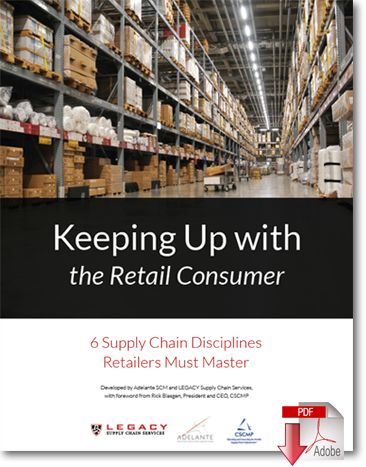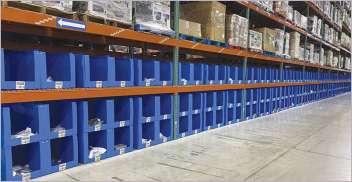We, consumers, are largely responsible for the transformation occurring in the retail industry.
Armed with smartphones and ubiquitous Internet connectivity, we are shopping online more, which is redefining the role of physical stores and how products are delivered.
We are less patient than in the past: with a single click, we want to instantly compare prices across retailers, check stock availability, and place an order - and we want it delivered tomorrow for free, or available for pick up at a nearby store within an hour.
E-commerce and omni-channel fulfillment, however, are not the only factors impacting retail supply chains.
As retailers continue to expand globally, both from a sourcing and selling standpoint, they have to deal with new competitors, currency fluctuations, importing and exporting challenges, regulations, trade agreements, and labor availability (among other risks and challenges).
Therefore, in light of all these trends, how can retailers drive profitable growth moving forward?
More specifically, how can supply chain and logistics operations help retailers increase sales, gain market share, and improve margins?
Keeping Up with the Retail Consumer: 6 Fundamental Supply Chain Disciplines that Retail Leaders of Tomorrow Must Master
How can supply chain management enable profitable growth?
Getting to the answer requires retailers to take a broader, more strategic perspective of supply chain management, one that goes beyond defining supply chain excellence only in terms of cost reduction and control.
More than ever before, excellence in supply chain management - especially in logistics functions – is about driving revenue growth, capturing market share, and enhancing customer satisfaction and loyalty.
For example, many retailers are using delivery as a competitive weapon.
In a market where consumers can find the same product for about the same price from multiple retailers, the ability to offer consumers less expensive (usually free), faster (trending toward same-day), and more flexible delivery options (such as deliver to store or locker) is what wins the retailer the sale and customer.
The 6 Fundamental Disciplines
- Supply Chain Visibility
- Supply Chain Mapping & Visualization
- Supply Chain Risk Management
- Supply Chain Design
- Supply Chain Business Intelligence
- Supply Chain Talent Retention & Workplace Culture Development
About the Authors
Adrian Gonzalez is the founder and president of Adelante SCM, a peer-to-peer learning and networking community for supply chain and logistics professionals. He is trusted advisor and leading industry analyst with more than 17 years of research experience in transportation management, logistics outsourcing, and other supply chain and logistics topics.
Mike Glodziak currently serves as President of LEGACY Supply Chain Services. He joined LEGACY in 2013, after serving as President of Vitran Supply Chain Operations beginning in 2004. Prior to that, Glodziak served as a principal with Tompkins Associates, where he managed large supply chain re-engineering projects in Mexico, the United States, and Canada.
Related: Interactively Evaluating Supply Chain Performance


Article topics













